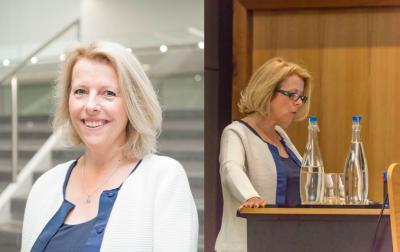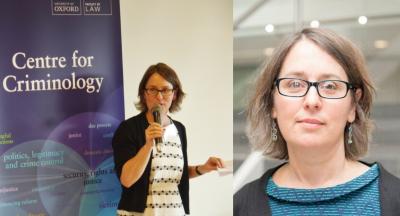Change of Guard
Professor Mary Bosworth takes over from Professor Carolyn Hoyle as Director of the Centre
Posted
Time to read

Before Ian joined our team in 2005, Roger Hood had been Director for over three decades. He had taken a tiny team of academics interested in crime and penology and established a thriving research institute with a great reputation among academics, criminal justice practitioners and policy-makers. In his last few years as Director, before his retirement, the political climate changed somewhat and our heavy reliance on ‘soft’ government funding became untenable. Ian recognised the inevitability of moving away from that model, encouraged his colleagues to more aggressively pursue other sources of funding, and, drawing on Roger’s legacy, created an institution with a culture and working practice, with which I was enormously proud to be associated.
Between them, Roger and Ian developed a centre of excellence in teaching and research, with a deservedly outstanding reputation among criminologists and socio-legal scholars in the UK and internationally. We have a good range of scholarship, covering diverse substantive issues and innovative methodological approaches, and a flourishing graduate program.
So, five years ago, when I was appointed Director of the Centre, I presumed life might be quite easy. I had to keep the ship on course and try not to blow the budget on too much wine at our events (it’s important to know your weaknesses!). In the year leading up to my directorship, however, it became clear that I could not simply be a ‘caretaker’ director. Certain changes to the funding landscape made clear that we were about to enter a new, rather austere fiscal climate, where regular success securing grants with full economic costing could not be guaranteed. Furthermore, it became clear that we had become a victim of our own success. With a burgeoning Masters and DPhil programme, there were simply too few of us to cover all the teaching, supervision and administrative duties required to continue to offer the best environment for our students. While I did not want a revolution, it was soon clear that the centre needed further to evolve to respond to the changing environment.
My first goal was relatively modest and easy to achieve; to bring Oxford Criminology into the 21st century, with a blog, and social media profile that could better connect us around the world. Getting our finances more secure was rather more demanding, but we got there. Fundraising – with the help of my faithful Assistant Director, Mary Bosworth - was at times bewildering, frustrating and occasionally (very occasionally) satisfying. It took us on a ‘friend-raising’ mission to the US, which we still long to see the fruits of. Managing the Centre through our five-year review was interesting and gave us a chance to show how successful we are. We also experienced considerable changes to our administrative support structure, changes that meant I was without an administrator for many months.
Overseeing the move from the Manor Road building to St Cross was exhausting. I now know far too much about building regulations, heritage, sockets and soft furnishings. During the move, I found myself clearing out our archive cupboards and found a box of papers showing that when Roger Hood moved the Centre to 12 Bevington Road he too had been rather more ‘hands on’ in the move than most may have realised! We are now in the new building, with a closer relationship with the Law Faculty and support from their administrators, with new programmes of research, including the successful ‘Border Criminologies’, and, after years of trying to secure a sixth permanent post in quantitative criminology, that final goal of mine is now in reach. It seems therefore a good time to step down and make room for new blood; for someone with experience and commitment to the Centre, with energy and vision. I am therefore delighted to be passing the reins to Mary Bosworth, who, along with my other colleagues, and our wonderful community of students, was supportive and inspirational in equal measures while I was Director. If my goal was the leave the Centre in safe but creative hands, I believe I’ve succeeded.
Carolyn Hoyle
... Looking ahead

But there are of course challenges ahead and opportunities as well. The Centre, like the rest of the country, will need to steer a course through Brexit and its aftermath. While we will doubtless be cushioned by our privilege and membership of the wider university, we will not be immune to the legal and cultural shifts Brexit will engender. Questions that arise, but cannot yet be answered include what effect it will have on enrolment, on funding and on staffing? We are, like much of the tertiary sector, an international group of scholars in Criminology, with global research interests as well as personal connections and roots elsewhere.
As Director I hope to consolidate more formally our international outlook, through the Global Criminal Justice Hub. Relatedly, I intend to build on our fundraising strategy to ensure that more people who wish to study with us and to conduct research here are able to do so. A global Centre will be diverse and will contribute to intellectual debates over race, ethnicity, justice and criminology. Thanks to the efforts of Dr Roxana Willis and Arushi Garg, the Centre will start this year with a workshop on race and criminal justice; many of our All Souls Speakers will address similar matters, while we are all looking forward to welcoming Prof. Vesla Weaver who will deliver the Roger Hood Annual Lecture in May 2018.
Recent events have not just questioned Britain’s place in the world, but also the role of experts. To that end too, I see an important role in the coming years of knowledge exchange and policy impact. The Centre has strong traditions in these matters, and so my role here will be to build on that, while identifying new opportunities. Current projects underway that capture our efforts in this area, include a collaboration between Oxford and Southampton Universities on the families of IPP prisoners, and a joint project between myself and Dr Hindpal Bhui from HM Inspectorate of Prisons on the role of human rights monitors in immigration detention in Europe, funded by the ESRC under their Impact Acceleration Account scheme.
This year, the Centre will grow, as we will be hiring a 6th permanent post in Quantitative Criminology. We will also be welcoming a series of new postdoctoral fellows. I will continue my efforts to obtain funding for a senior research fellow on race and ethnicity.
As I take over the role of Centre Director, I look forward to fostering and supporting the creativity of my colleagues and our students, and to building ties with colleagues around the world. We live in uncertain and distressing times. Now, more than ever, we need to think critically and work collectively and creatively.
Mary Bosworth
Share